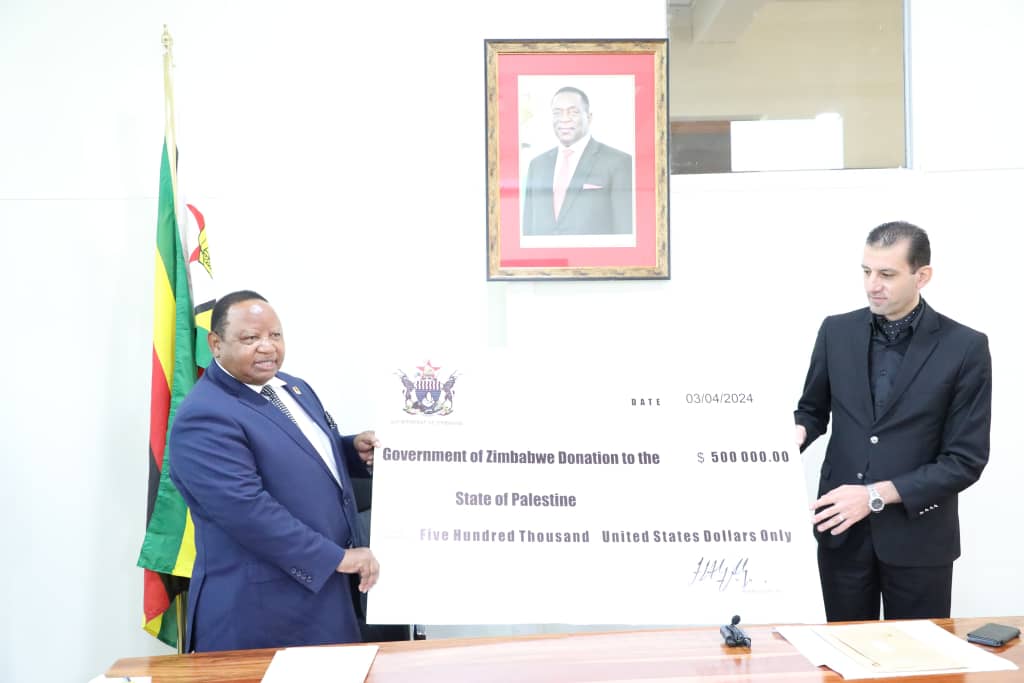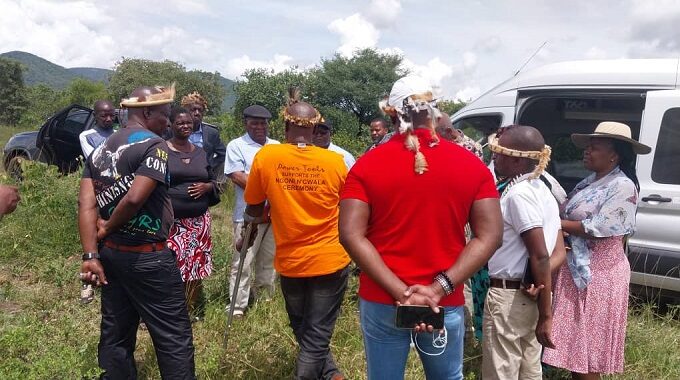
Alex T. Magaisa
Yesterday, the BSR published part of a long list of beneficiaries of the Farm Mechanisation Scheme, which was run by the Reserve Bank of Zimbabwe through its wholly-owned subsidiary, FISCORP. Today, the former head of the RBZ, Retired Governor Dr Gideon Gono responded to the BSR through the Sunday Mail, the State weekly newspaper.
Dr Gono told the Sunday Mail that the BSR had made “unfounded allegations and inaccurate, and unfair conclusions that border on defamation”. It is essential and in the public interest for me to respond to the response by Dr Gono, hence this reply to a reply.
A matter of confidence
First, I observe that Dr Gono shared with the Sunday Mail, a private message which he sent to me. This conduct does not score well in my estimation. I have applied my mind to the matter and decided that it would not be ethical for me to respond in kind. This is although the breach of confidence opens a gateway to do so. What would that say to others who engage me in private? Although one could draw much capital from disclosures, it is not necessary to take that route because it is low. I suspect Dr Gono will, upon sober reflection, appreciate that it was not prudent to share his message to me with the newspaper.
However, I can confirm that we did have a conversation over the BSR during which he expressed his reservations which are now a matter of public record. I welcomed his intervention because the public is served by more, not less information. The list of beneficiaries of the scheme has always been a matter of public interest, and it is only fair and necessary that those who have the complete list share it with the public.
Some have protested that the list shared in the first BSR was incomplete. I acknowledge this criticism but also point to the fact that the BSR never made suggested that it was the complete. It is in part a reflection of the information available to us and partly because of the thematic categorisation which we used for the data – hence judges, commissions, the clergy, etc. Some of the individuals who have excited people by their so-called “exclusion” might fall in a different category, which best describes their role. There are also some obscure entities whose details are still the subject of on-going verification, and details of one province are missing. We have worked with what we have. I have neither the need nor desire to protect anyone.
So no, there is no cherry-picking or nefarious plan apart from the public interest to uphold the constitutional values of transparency and accountability. Indeed, those who have the full list must take the opportunity to furnish it to the public. This is why I find it disappointing that the former Governor’s clarification does not fill the gaps.
Facts are not disputed
The second observation is that the former Governor’s response does not dispute the accuracy of the list of beneficiaries and the value of equipment and machinery received. As a general rule, where someone undertakes to respond in order to refute a narrative, those parts that are not disputed are deemed to be accepted. The facts are that the named individuals received the machinery and equipment from the RBZ. What Dr Gono disputes is the characterisation of these transactions but not to the accuracy of the transactions.
Indeed, even the most vociferous protestors on social media, such as Norton legislator, Temba Mliswa, MP, have not denied receiving these assets. They are merely justifying them. So I am not sure what Dr Gono meant by unfounded or inaccurate allegations. The facts have not been challenged.
Was it a loan?
The primary point of the dispute seems to be the nature of the transactions. The BSR referred them as loans and that the beneficiaries had failed to repay them until the State assumed them in 2015.
Dr Gono says, “I can state categorically that Dr Magaisa is offside and that no beneficiary of the farm mechanisation programme ever refused to pay for the equipment that they got and neither were they asked to pay”. The purpose of this statement was to bolster the view that the transactions were not loans but free handouts.
However, this is inconsistent with the statement at the end of the article where Dr Gono is quoted as saying, “Both rural and non-rural farmers benefited from the takeover of the loans by the State …”.
The adage that one cannot have his cake and eat it at the same time is apposite. One statement says it was not a loan, but the other says it was a loan taken over by the government. It can’t be both at the same time. It is these contradictions that give rise to opacity which fuels more speculation and suspicions.
Letter to the Minister – 2011
However, documentary and historical evidence suggests that the transactions were loans. The BSR quoted a letter by the former Governor to the then Minister of Agriculture, Dr Joseph Made. Part of that letter reads,
“As you are aware, Honourable Minister, the Bank is owed a lot of money by beneficiaries of the Farm Mechanization Programme. The Board needs your advice on the way forward given the political nature of the circumstances surrounding this debt.”
The existence of this letter was not disputed. It clearly states the position at the time, three years after the scheme, that the RBZ was “owed a lot of money by beneficiaries of the Farm Mechanisation Scheme”. If these goods were free, why was it necessary to characterise them as debts owing from the beneficiaries?
Zimbabwe Independent story – 2008
There are also various newspaper articles from the relevant period which demonstrate the impression that the transactions were loans. A good example is a story by the Zimbabwe Independent newspaper of 16th May 2008 which was headlined, “Mechanisation Debts Balloon”. “Government is in a quandary over what to do with the huge debts it is owed by farmers who benefited from the farm mechanisation programme following the changes to the exchange rate”, the newspaper reported. This clearly showed that these transactions were regarded as loans to the beneficiaries.
The paper also reported that there was pressure from some government officials who wanted the debt to be written-off . They argued that the majority of farmers would not be able to make the repayments due to movements in the exchange rate during the hyperinflationary era. “They want the programme to be treated like a national project which [the] government undertook to help farmers. This proposal is tied, of course, to political support for the government”. The Zimbabwe Independent concluded that whatever route was taken to resolve the matter, the government would end up carrying huge losses on the programme. This indeed, is what eventually happened when the government took over the debts in 2015.
The Herald story – 2010
The state-run daily, The Herald also ran a story on 4th February 2010 with the headline, “Farm Mechanisation Scheme Beneficiaries to Pay Up – Gono”. If someone doubts the Zimbabwe Independent because it is a private paper, the Herald is the trusted propaganda arm of the government. And here it was stating in clear terms that, “Beneficiaries of Government’s Farm Mechanisation Programme launched in 2007 will start paying for the machinery this year, with the Reserve Bank of Zimbabwe currently working on repayment modalities. In a statement yesterday, RBZ Governor Dr Gideon Gono said they had already completed preparations for stop orders or cash payments”. It is up to Dr Gono and the authorities to challenge the accuracy of these narratives; to say The Herald lied.
Newsday story – 2014
While there has been some excitement over the BSR on the farm mechanisation debt saga and subsequent tantrums from beneficiaries and their associates, revelations of beneficiaries are not new at all. Some of this information was already in the public domain and was never challenged. Newsday, the private daily paper, reported on 3rd February 2014 under the headline “ZANU PF chefs named in farm equipment scheme”. The only difference is that the Newsday story focused on Mashonaland East province and did not include details of the amounts that were loaned to the beneficiaries. The point here is that this information has already been in the public domain. It is not a secret but people sometimes do not pay attention to the media.
In the same story, Newsday also reported that the Public Accounts Committee of Parliament had ordered the Ministry of Agriculture to disclose names of all beneficiaries and that Governor Gono had “refused to disclose the names of the beneficiaries of the farm implements to parliament when he appeared before the agriculture portfolio committee [in 2013]”. Therefore, the demand for information on beneficiaries is not new. People like legislator Temba Mliswa ask why now as if this is the first time that this information has been sought and revealed.
Newsday story – 2015
The current Governor of the RBZ, Dr John Mangundya, also refused to disclose the names of the beneficiairies of the Farm Mechanisation Scheme in 2015. In the story, “RBZ governor conceals farm mechanisation beneficiaries”, journalist Moses Matenga reported that “most of the beneficiaries were believed to be top ZANU PF and government officials”. When top layer Beatrice Mtetwa requested the names of beneficiaries before the RBZ Debt Assumption Bill was passed into law, the governor said it was a matter for FISCORP, and client confidentiality was cited. Since when are beneficiaries of a public scheme regarded as “clients” deserving of confidentiality like bank customers? Even as late as 2015, the transactions were treated by authorities as loans.
Why were they credit-rated?
Another fact that shows that these transactions were treated as loans is that all beneficiaries were given credit ratings. The highest credit rating, according to the scheme was A. An A credit-rating means the RBZ considered you as most able to repay, while a C credit rating was the lowest among beneficiaries.
The point here is, why would the RBZ rate the credit-worthiness of beneficiaries if their ability to repay a loan was not an issue? Credit-rating is something that banks rely on when issuing loans to determine whether the person has the capacity to repay. The irony, of course, is that although the majority of elites were given an A credit rating, they still did not pay their loans. Some of them still hold public office and may have gone on to get more loans from the government banks.
It would be interesting to know which firm was given the contract to do the credit-rating of beneficiaries because it would have been paid for the job, using public funds. Why would the RBZ pay for credit ratings which it does not need?
As an aside, this is why it is imperative to know who had their loans taken over by ZAMCO, mostly from the CBZ. As the BSR has discussed before, ZAMCO is yet another grand scam masterminded to assist the elites.
No wisdom in denying
Therefore, the fact that these transactions were initially framed as loans is evident from history. In the latest Sunday Mail article, Dr Gono says the position that no-one should repay “was arrived at after consultations with the Government which took the decision and wrote to him that equipment given to farmers during that most trying period should not be regarded as a loan to anyone and therefore no payment was to be made by the beneficiaries of the programme”.
This means this was a position taken after the fact, and it is consistent with the view that the transactions were initially treated as loans before the government decided otherwise.
All in all, I do not think there is any wisdom in denying that these transactions were characterised as loans. Whether the RBZ and FISCORP handled them properly as loans should be handled is a matter for investigation. But the evidence on show leaves no doubt that these transactions were presented as loans which were supposed to be repaid.
Worse alternative: Freebies
The alternative, which Dr Gono and others seem to be pushing is far worse. In their efforts to argue that they were not loans and that no-one owes the taxpayers, they are digging the hole when they should be getting out of it. The picture is quite ugly: selected beneficiaries got machinery and equipment without signing any formal agreement imposing legal obligations upon them. Millions of dollars worth of property freely handed out to elites. A person could collect the equipment and sell it on or lease it to others for a fee. What kind of scheme is it that involves so many millions without proper systems and controls of accountability?
Some of the testimonies in the wake of the BSR show a lot of confusion. Some are saying, just like Dr Gono, that they were not loans. However, some are saying they were loans and that they made repayments. Still, others are saying they made efforts to repay but found no willing taker at the RBZ. Some are saying they were just called and told that they had tractors and other equipment awaiting collection. These conflicting narratives show a disconcerting system which was opaque and open to abuse. Has the RBZ ever made a follow-up audit to check on the fate of this expensive equipment: whether it is still functional and whether the beneficiaries still have it? After all, the list has all the details, including the type of equipment, serial and asset numbers.
Odious debts
Finally, Dr Gono argues that there is nothing untoward concerning the government taking over farmers’ debts because, after all, the new Zimbabwean government inherited colonial debt from the Smith regime. The argument is that colonial debt included agricultural support given to the white farmers. A legislator, Temba Mliswa had made a similar argument on Twitter in the wake of the BSR. This kind of false equivalence is highly problematic. Still, it also reveals a perennial tendency to draw inspiration from a system that ZANU PF purports to despise. It says, if you did it for Smith, why can’t you do it for us, which is a disingenuous line of reasoning because it means we have learnt nothing from the past.
But by equating farm mechanisation debt to colonial debt is self-defeating. The colonial debt they are referring to is called odious debt for good reasons. It is so-called because it is debt that was acquired in unfair and unjust circumstances which supports the view that it should be written off. Those who are against odious debt actually advocate against the state and taxpayers being saddled with odious debt. And that indeed, if they hadn’t noticed is precisely what critics of the Farm Mechanisation Debt are saying. They are saying this debt is odious debt. It should never have been imposed upon the State and therefore upon taxpayers. Instead, because of its odious nature, it should be carried by beneficiaries. After all, most of them are still alive and claim to be prosperous farmers and businessmen.
Conclusion
The responses are symptomatic of a political and quasi-political class that has a high sense of entitlement. The great worry is that they see nothing wrong with this situation. Instead of being remorseful and seeking atonement with the people, they are adamant, aggressive and threatening. If they were not loans, then there were lots of misrepresentations concerning public funds.
Our Constitution requires public officers to protect public property, which includes public funds. Section 196 of the Constitution provides that public officers in leadership positions must abide by the following principles – honesty in the execution of public duties; accountability to the public for decisions and actions. Section 308 adds that “It is the duty of every person who has custody or control of public property to safeguard the property and ensure that it is not lost, destroyed, damaged, misapplied or misused”. These are important principles and it is well known that the Constitution is the supreme law of the country. Public officers, past and present have a duty to uphold these principles.
That it is in the public interest to know the beneficiaries of the scheme is summed up by a Mr Tavazazadza, a new farmer who was a beneficiary of the scheme when he testified before the parliamentary portfolio committee on Finance and Economic Development during a hearing for the RBZ Debt Assumption Bill. “I am a farmer and a beneficiary of farm mechanisation and I am prepared to pay for the pump that I got,” he said. “There are people who got tractors and combine harvesters and most of them are deriving benefit from this equipment. It becomes unfair to ask ordinary people to pay for such equipment.” This was reported by The Herald on 18th September 2014, under the headline, “Farm Mechanisation beneficiaries should pay”.
Here was a decent man who was ready and willing to carry his cross. Meanwhile, the elites who got combine harvesters, many tractors and other expensive equipment see no reason to pay up. Instead, they manufacture reasons to avoid payment, seeing conspiracies and issuing subliminal threats. The sense of entitlement and arrogance is staggering.
WaMagaisa
wamagaisa@yahoo.co.uk






